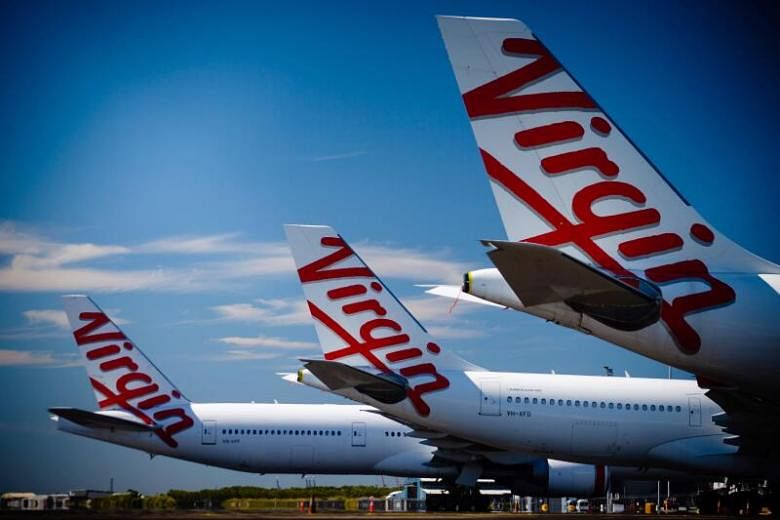SYDNEY - On the tarmac at Perth airport last week, unusual images emerged showing aircraft being blockaded by bulldozers, trucks and portable staircases which were used to prevent the jets from taking off.
Officials from Perth Airport said they were taking possession of the aircraft, which belonged to Virgin Australia, the country's second largest carrier after Qantas. The airport said Virgin owed it A$16 million (S$14.8 million) for use of the airfield and terminal.
While other airports have been less confrontational, this bizarre standoff reflects growing anxieties about the future of Virgin.
The airline, which is about 20 per cent owned by Singapore Airlines, has gone into administration after Canberra refused its demand for a A$1.4 billion lifeline to help it through the Covid-19 crisis, which has forced the company to ground its international fleet and suspend almost all of its domestic flights.
The airline reportedly owes about A$6.8 billion to creditors, including lenders, employees and airports. It employs about 10,000 workers, though about 8,000 have been stood down since coronavirus-related travel restrictions were imposed.
About 11 potential buyers are believed to be considering making bids for the airline. But there are growing questions about whether Australia can actually handle a second major carrier.
The country has a vast landmass but a relatively small population, which is centred in the major capitals. While the Sydney-Melbourne route is one of the most lucrative in the world, other routes to regional areas are far less profitable.
Virgin started flying in Australia in 2000 but grew rapidly after Ansett, which used to be Australia's second major carrier, collapsed in 2001.
According to Dr Tony Webber, the chief executive of aviation analysis firm Airline Intelligence and Research, Australia's domestic market generates A$1 billion in annual profit, which should be enough to sustain two well-run airlines. But he said new entrants have historically found it hard to compete with Qantas, which has a dominant position and prime airport locations.
In Sydney, for instance, Qantas has its own domestic terminal, while Virgin shares one with other budget and regional airlines.
"There's enough money for two players," Dr Webber told The Australian Financial Review.
"It's very difficult for player No. 2 two to make any ground… A lot of it is just that Qantas is an incredibly aggressive competitor with a very good product."
A failure to secure a buyer for Virgin who can rebuild it into a strong airline would leave Qantas with an effective monopoly.
Business commentator Ian Verrender said the demise of Virgin would remove pressure on Qantas and its low-cost carrier Jetstar to offer discount fares.
"It's difficult to overstate the impact Virgin has had on airline travel," he wrote on the ABC News website. "From day one, it forced fares down."
Not surprisingly, the Federal Government has been trying to ensure that Virgin emerges in a strong position.
The Prime Minister, Mr Scott Morrison, said Australia needed "two viable carriers", particularly as the nation emerges from the Covid-19 pandemic and tries to rebuild the economy.
"It is very important in usual times (to have two carriers) but it will be even more important as we emerge from the coronavirus economic crisis, ensuring that we have those carriers in place," he told reporters.
Mr Rod Sims, the chair of Australia's corporate regulator has warned Qantas not to try to stifle competition against a revived Virgin by artificially reducing prices or flooding routes with seats. He said the authorities would be on the lookout for any attempt to unlawfully "make it very difficult for the new player, who is, of course, usually very dependent on some early cash flow".
Some commentators now believe the most likely outcome is that another airline such as SIA or a carrier from China takes over Virgin. But a lingering question - as the Perth experience showed - is what will happen to its debt. The government's hope, at least, is that a strong Virgin will soon emerge and will then be able to repay much of its debt and quickly take off again.












